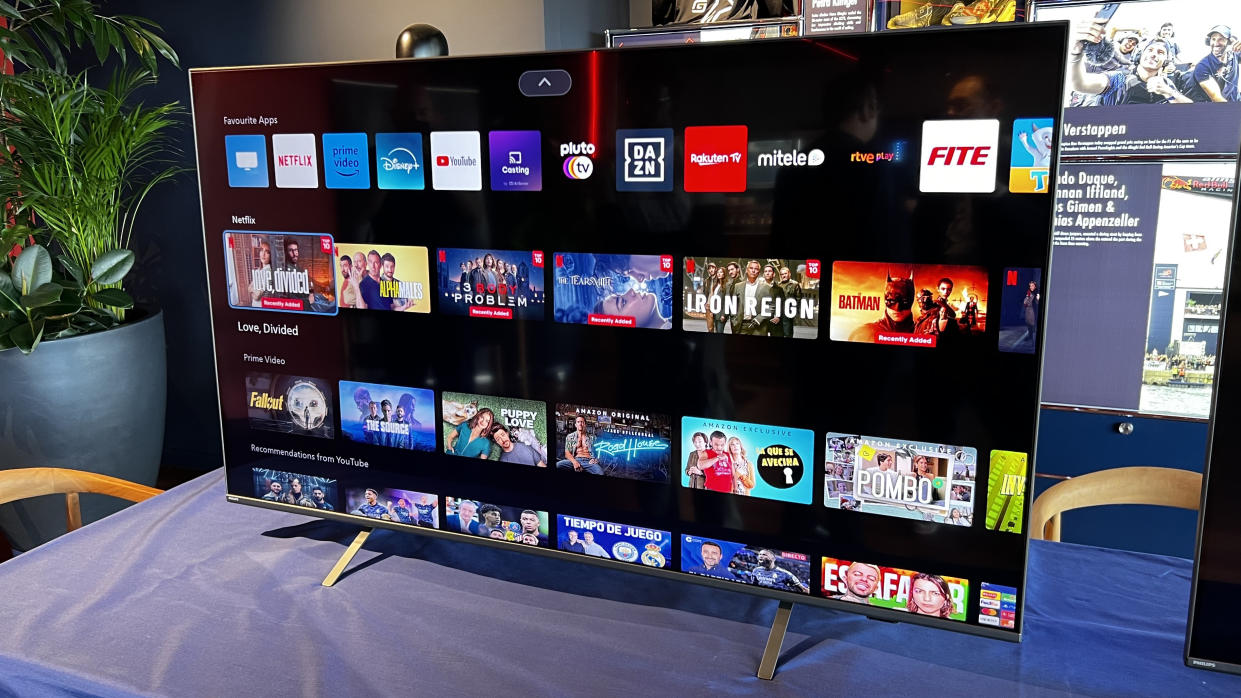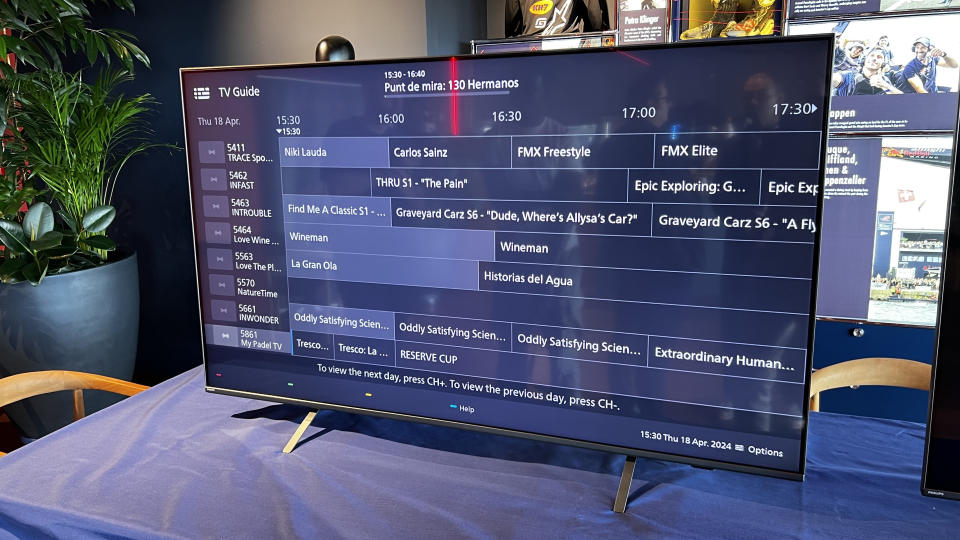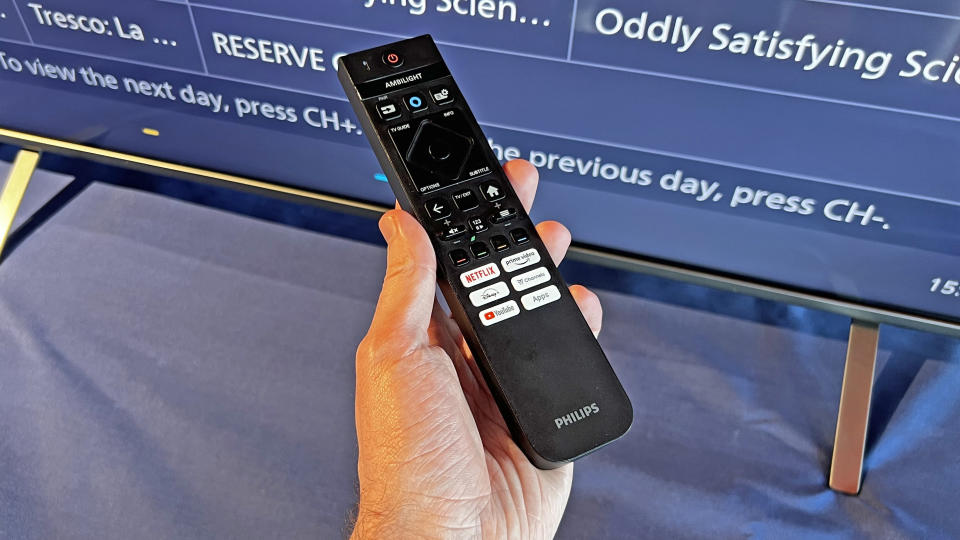Titan OS is a new smart TV platform that’s interesting because it’s basic – it's faster and simpler than others, and drops all the needless extra features

The world of smart TV software options on the best TVs is only getting more complicated over time. Some TV makers use their own software and keep it strictly on their own TVs, but you’ve also got the likes of LG webOS, Roku TV, Google TV, and Amazon Fire TV all competing to be on TVs from other manufacturers. And now there’s another name in the ring: Titan OS.
After an in-depth demo session, I found Titan OS interesting not because of the new features it brings to the table but because of the lack of them – or, rather, the lack of complexity in the system. The focus here is on making it take less time to get you actually watching something by making a fast operating system with fewer clicks on the remote needed to find the stuff you like.
That includes not just on-demand stuff from the big streaming services, but also making better use of free streaming channels right in the main interface. Based on the time so far, I like the look of it.
Speaking of the look, there’s nothing revolutionary going on here. It looks like nearly every other smart TV software, and I think that’s a good thing. You’ve got a row of advertising for new shows at the top (creating/designing a new TV interface has to pay for itself somehow), then a list of app favorites you can use to launch services, and then rows of recommendations from your apps, or for channels you watch regularly. Easy, works well, and if you’ve used smart TV software recently, you’ll probably be able to transfer your navigation skills to Titan.

At the top are tabs to switch between a few key options, such as live TV channels, a list of available apps, or over on the right are some options for accessing Settings. It actually reminds me a lot of the PS5 Home screen in that way.
But what impressed me most about this Home screen is the speed. Hitting ‘Resume’ to watch something on Netflix had the movie playing within a couple of seconds, with no extra hassle or time spent looking at a loading symbol. Even my Apple TV 4K, which has the processing power of a lightweight laptop, doesn’t manage that. When I played more with the platform, it became clear that speed is an advantage overall – it seems like it might be just less frustrating to navigate and use than many smart platforms. Even Amazon Fire TV, with such a powerful company behind it, has lag issues, especially on cheaper TVs.
Titan won’t arrive with in-depth smart home integration or anything like that, but I think it’s probably on the right lines with this: I suspect that if you asked most people if they want a faster TV system or one with loads of extra features, they’d say the former.
However, it does have some extra smarts that sound good – but again, focused on what you’ll watch. For a start, Titan promises that the platform will learn what you watch and get better at making recommendations over time, hopefully making it quicker to actually find something to watch, which is genuinely one of the big hurdles of TV viewing today.
But also, Titan does a smart thing of integrating any free live streaming channels you can access right into the main channel guide, along with any broadcast channels you’ve tuned it into. In the UK, that means you can have channels like Pluto TV alongside your Freeview channels, and they’re all just treated as channels you can scroll through and watch. There’ll be no big distinction between them, so you’ll just have a larger, richer selection of channels to choose from.

Titan will also include Freely integration by the time it launches later in the year, with this streaming alternative to Freeview all supported right from the program guide too.
To make all of the above easier. Titan actually comes with all of its available apps pre-installed – you don’t have to hunt in an app store and create an account to find services or to update them. Go to the Apps tab and just browse what’s there – and if anything you don’t like appears on the Home screen, it’s easy to just remove it and put it out of sight.
Again, I think this is a positive move – it might make people more likely to try free streaming services they wouldn’t bother with otherwise.
However, the downside of Titan right now looks to be its range of streaming services. In the UK, the current range of streamers is the following:
Netflix
Prime Video
Disney+
BBC iPlayer
iTVX
ALL 4
My5
Freeview Explore
YouTube
Rakuten TV
Pluto TV
Now, I use Shudder and Mubi to name just two missing from here, and the lack of BFIPlayer and Kanopy, among others, will also be a shame for hardcore movie lovers – while the lack of things like HAYU and Britbox may be a frustration for others. And then there’s no Apple TV or Google Movies for those who have libraries there.
However, Titan is months away from launch, so there’s time for this to be fixed. Some of the services I mentioned above are quite niche, so not everyone will mind – but when I spoke to people behind the development of Titan, one of the big reasons for its existence is to make sure that people who buy TVs from the brands Titan is used on don’t feel disappointed long-term by their TV’s smart platform. If it doesn’t have services they might grow to want, then it may still fall foul of that.

There's also no deep voice control planned currently – if a TV has Alexa support, you could use this to dictate into search fields, but there won't be the option to say "Titan, play One Piece on Netflix." Again, some people won't like the lack of this, some might be delighted to kick voice assistants to the kerb.
Titan is expected to appear on Philips TVs and some JVC TVs in the UK later in 2024. The company is focused on Europe and South America at first but may look to launch in North America in the future.

